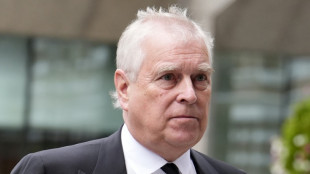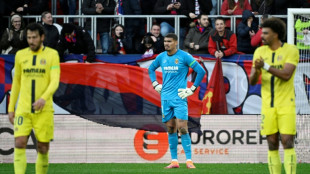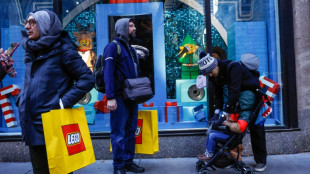-
 French IT giant Capgemini to sell US subsidiary after row over ICE links
French IT giant Capgemini to sell US subsidiary after row over ICE links
-
Iran's Khamenei likens protests to 'coup', warns of regional war

-
 New Epstein accuser claims sexual encounter with ex-prince Andrew: report
New Epstein accuser claims sexual encounter with ex-prince Andrew: report
-
Italy's extrovert Olympic icon Alberto Tomba insists he is 'shy guy'

-
 Chloe Kim goes for unprecedented snowboard halfpipe Olympic treble
Chloe Kim goes for unprecedented snowboard halfpipe Olympic treble
-
Pakistan combing for perpetrators after deadly separatist attacks

-
 Israel partially reopens Gaza's Rafah crossing
Israel partially reopens Gaza's Rafah crossing
-
Iran declares European armies 'terrorist groups' after IRGC designation

-
 Snowstorm disrupts travel in southern US as blast of icy weather widens
Snowstorm disrupts travel in southern US as blast of icy weather widens
-
Denmark's Andresen swoops to win Cadel Evans Road Race

-
 Volkanovski beats Lopes in rematch to defend UFC featherweight title
Volkanovski beats Lopes in rematch to defend UFC featherweight title
-
Sea of colour as Malaysia's Hindus mark Thaipusam with piercings and prayer

-
 Exiled Tibetans choose leaders for lost homeland
Exiled Tibetans choose leaders for lost homeland
-
Afghan returnees in Bamiyan struggle despite new homes

-
 Mired in economic trouble, Bangladesh pins hopes on election boost
Mired in economic trouble, Bangladesh pins hopes on election boost
-
Chinese cash in jewellery at automated gold recyclers as prices soar

-
 Israel to partially reopen Gaza's Rafah crossing
Israel to partially reopen Gaza's Rafah crossing
-
'Quiet assassin' Rybakina targets world number one after Melbourne win

-
 Deportation raids drive Minneapolis immigrant family into hiding
Deportation raids drive Minneapolis immigrant family into hiding
-
Nvidia boss insists 'huge' investment in OpenAI on track

-
 'Immortal' Indian comics keep up with changing times
'Immortal' Indian comics keep up with changing times
-
With Trump mum, last US-Russia nuclear pact set to end

-
 In Sudan's old port of Suakin, dreams of a tourism revival
In Sudan's old port of Suakin, dreams of a tourism revival
-
Narco violence dominates as Costa Rica votes for president

-
 Snowstorm barrels into southern US as blast of icy weather widens
Snowstorm barrels into southern US as blast of icy weather widens
-
LA Olympic chief 'deeply regrets' flirty Maxwell emails in Epstein files

-
 Rose powers to commanding six-shot lead at Torrey Pines
Rose powers to commanding six-shot lead at Torrey Pines
-
The Blessing of Good Fortune Is Here: Own Equity in a Lithium Mining Company - Elektros Inc. - at a Bottom-Basement Discount, Right Here, Right Now

-
 Barca wasteful but beat Elche to extend Liga lead
Barca wasteful but beat Elche to extend Liga lead
-
Konate cut short compassionate leave to ease Liverpool injury crisis

-
 Dodgers manager Roberts says Ohtani won't pitch in Classic
Dodgers manager Roberts says Ohtani won't pitch in Classic
-
Arsenal stretch Premier League lead as Chelsea, Liverpool stage comebacks

-
 Korda defies cold and wind to lead LPGA opener
Korda defies cold and wind to lead LPGA opener
-
New head of US mission in Venezuela arrives as ties warm

-
 Barca triumph at Elche to extend Liga lead
Barca triumph at Elche to extend Liga lead
-
Ekitike, Wirtz give Liverpool sight of bright future in Newcastle win

-
 West Indies 'tick boxes' in shortened T20 against South Africa
West Indies 'tick boxes' in shortened T20 against South Africa
-
Chelsea have something 'special' says Rosenior

-
 De Zerbi 'ready to go to war' to solve Marseille troubles
De Zerbi 'ready to go to war' to solve Marseille troubles
-
Hornets hold off Wemby's Spurs for sixth NBA win in a row

-
 Moyes blasts killjoy booking after Everton's late leveller
Moyes blasts killjoy booking after Everton's late leveller
-
Ex-prince Andrew again caught up in Epstein scandal

-
 Bayern held at Hamburg to open door for Dortmund
Bayern held at Hamburg to open door for Dortmund
-
Atletico stumble to draw at Levante, Villarreal held

-
 Chelsea stage impressive fightback to beat West Ham
Chelsea stage impressive fightback to beat West Ham
-
Arsenal stretch Premier League lead, Chelsea fightback breaks Hammers' hearts

-
 Napoli edge Fiorentina as injury crisis deepens
Napoli edge Fiorentina as injury crisis deepens
-
How Lego got swept up in US-Mexico trade frictions

-
 UK rights campaigner Tatchell arrested at pro-Palestinian protest
UK rights campaigner Tatchell arrested at pro-Palestinian protest
-
Iran says progress made towards US talks despite attack jitters

Trump’s Crackdown: Lives/Risk
In a dramatic push to tackle the skyrocketing cost of prescription drugs in the United States, President Donald Trump has taken decisive action against the pharmaceutical industry. With the stroke of a pen, he signed an executive order designed to slash drug prices, promising relief for millions of Americans burdened by exorbitant healthcare costs. However, this bold move has sparked fierce debate, with critics warning that the consequences could be catastrophic—potentially costing millions of lives due to drug shortages and stifled innovation.
Trump’s Plan to Lower Drug Prices
The executive order, enacted on May 12, 2025, seeks to align U.S. drug prices with those in other developed nations, where medications often cost a fraction of what Americans pay. Trump has long criticized the pharmaceutical industry for what he calls unfair pricing practices, arguing that U.S. consumers have been overcharged for years. The order aims to reduce prices by 30% to 80%, targeting both brand-name and generic drugs. It relies on voluntary compliance from drug companies, with the threat of future regulations looming if they fail to cooperate. For many patients, this could mean significant savings on medications that currently drain their finances.
The Dark Side: Drug Shortages Loom
While the goal of affordability is laudable, the plan has raised red flags among healthcare experts and industry leaders. One major concern is the risk of drug shortages. The U.S. already faces periodic shortages of critical medications, such as those used in cancer treatments and epidurals. Forcing pharmaceutical companies to lower prices could make it unprofitable to produce certain drugs, particularly low-cost generics. If production slows or stops, hospitals and pharmacies could struggle to secure enough supply, leaving patients without access to life-saving treatments. The ripple effect could be devastating, especially for vulnerable populations like cancer patients and the elderly.
A Blow to Innovation
Beyond immediate supply issues, the executive order could deal a severe blow to pharmaceutical innovation. Developing new drugs is an expensive and risky endeavor, often costing billions of dollars and taking years of research. The U.S. market, with its higher drug prices, has long been a key source of revenue for this work. If that revenue shrinks, companies may cut back on research and development, slowing the creation of new treatments for diseases like Alzheimer’s, cancer, and rare genetic disorders. A healthcare economist recently cautioned that such a move could “delay breakthroughs that millions of patients are counting on,” trading short-term savings for long-term losses in medical progress.
Economic Fallout
The economic implications are equally troubling. The pharmaceutical industry employs thousands of Americans and drives significant investment in the U.S. economy. Lower prices could lead to job cuts and reduced funding for new projects. One major drug company has already hinted at rethinking its $50 billion investment in the U.S. if the order takes full effect. While consumers might save money at the pharmacy, the broader economy could suffer as a result.
The Case for Change
Despite these risks, supporters argue that action is overdue. Prescription drug prices in the U.S. are nearly three times higher than in other advanced countries, forcing many Americans to ration their medications or skip doses entirely. Lowering prices could save billions of dollars and improve access for those with chronic conditions like diabetes or heart disease. For these patients, Trump’s order represents a lifeline—a chance to afford the drugs they need to survive.
A High-Stakes Gamble
As the dust settles, the debate rages on. Will Trump’s crackdown on the pharmaceutical industry deliver on its promise of affordable healthcare, or will it unleash a cascade of unintended consequences? The order’s success hinges on cooperation from an industry reluctant to sacrifice profits, and its failure could leave patients paying the ultimate price. For now, the nation watches as this high-stakes gamble unfolds, with millions of lives in the balance.

Trump's threats to Colombia

COSTCO profits from Fees

AI bust: Layoffs & Rent surge

Trap laid, Ukraine walked in

BRICS-Dollar challenge

Saudi shift shakes Israel

Al-Qaida’s growing ambitions

Argentina's radical Shift

Hidden Cartel crisis in USA

New York’s lost Luster

Europe’s power shock



